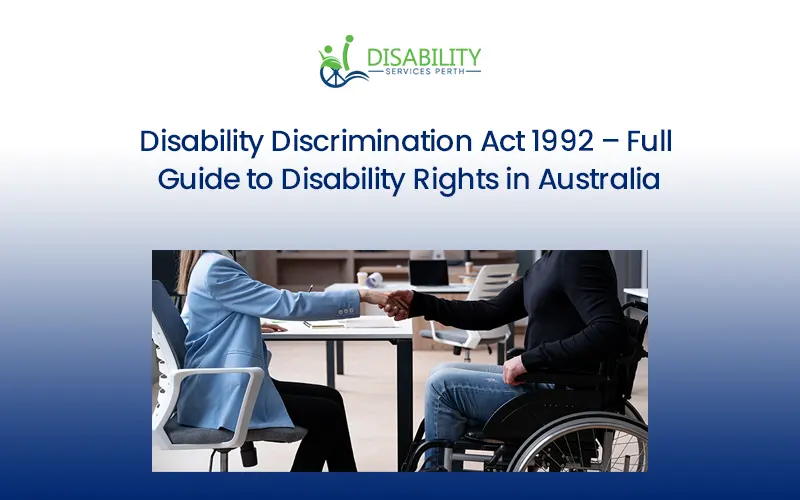Disability Discrimination Act 1992 – Full Guide to Disability Rights in Australia

Overview
What is the DDA?
The Disability Discrimination Act 1992 makes it unlawful to treat people with disabilities less favorably or deny them equal access to employment, housing, education, essential services, and participation in public life.
Historical Context
Before the DDA, people with disabilities faced unfair treatment, limited opportunities, and unequal rights. Its introduction in 1992 marked a turning point in Australia's human rights framework.
Main Purposes of the Act
Equal Rights
Ensures equal rights and opportunities in society
Eliminate Discrimination
Eliminates disability-based discrimination across Australia
Encourage Inclusion
Encourages inclusion and acceptance of people with disabilities
Reasonable Adjustments
Encourages reasonable adjustments in study and work environments
Key Rights Protected
Employment Rights
Equal access to jobs, training, and promotions
Housing Rights
Rent or buy homes without discrimination
Education Rights
Participation in education at all levels
Protection from Harassment
Freedom from bullying, harassment, and victimization
Public Access
Enter and use all public places and essential services
Where the Act Applies
💼 Employment
Protection in recruitment, hiring, promotions, workplace conditions, and employment terms. Includes flexible hours, adaptive equipment, and accessible facilities.
🎓 Education
Access to primary, secondary, and tertiary education. Requires accessible materials, flexible teaching methods, and assistive technology.
🚌 Public Transport
Accessible buses, stations, terminals, and trains. Includes audio/visual announcements, designated seating, proper signage, and ramps.
🏠 Housing
Protection in rental and property sales. Landlords must make reasonable adjustments like ramps and accessible bathrooms.
💻 Digital Access
Website and app accessibility, screen reader compatibility, accessible design, and video captions for equal digital participation.
🏦 Services
Essential services like banking and insurance must be accessible and provide equal treatment to people with disabilities.
Enforcement and Complaints
Australian Human Rights Commission Process
Submit Complaint
Outline the discrimination incident to the Commission
Investigation
Review and conciliation process between parties
Court Referral
If unresolved, may proceed to Federal Court
Impact Over Three Decades
✅ Successes
- ✓ Promoted equal opportunity and participation
- ✓ Driven changes in transport and digital platforms
- ✓ Protected justice and equality through AHRC
- ✓ Raised community awareness about disability rights
- ✓ Fostered a more respectful and supportive society
⚠️ Ongoing Challenges
- ! Transport and digital platforms still lack accessibility
- ! Limited career progression opportunities
- ! Some service providers unaware of DDA responsibilities
- ! Complaint processes can be lengthy and stressful
- ! Continued unfair treatment in some settings
Case Studies
Sylvana's Case
Living with Fibromyalgia and Hypermobility, Sylvana passed an interview for a clerical position but was rejected after a medical check. She complained of disability discrimination, and the matter was resolved through conciliation with a monetary settlement.
Resolved at ConciliationGabriel's Case
A person with ADHD and Autism complained that his employer failed to provide consistent, reasonable adjustments and overlooked him for promotions. The matter was resolved through conciliation with a monetary settlement.
Resolved at ConciliationFuture of Disability Rights
Conclusion: Building an Inclusive Australia
The DDA 1992 remains a cornerstone of equality and inclusion in Australia, protecting rights across multiple areas of life and giving people with disabilities the ability to thrive with dignity and freedom.
Together, we continue to build a fair environment in Australia for people with disabilities, ensuring the Act remains relevant and effective in promoting equality and inclusion for all.
